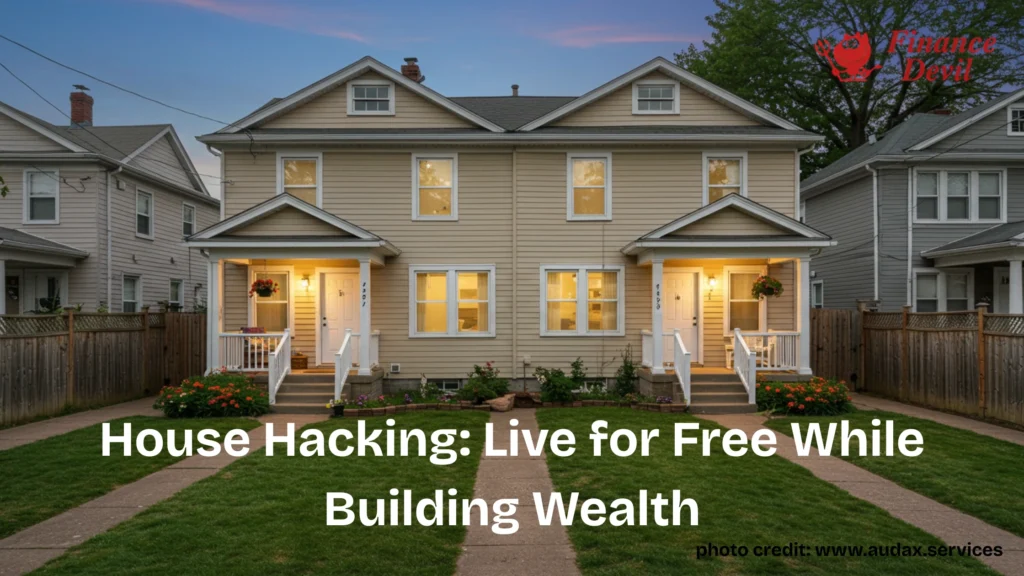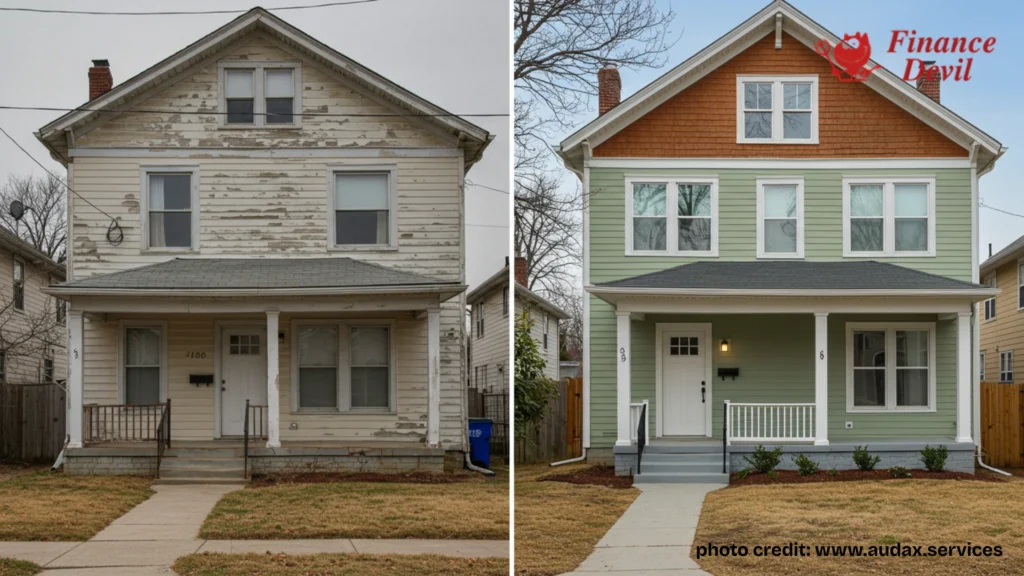Introduction: Why House Hacking Makes Financial Sense in 2025

In today’s challenging economic climate, where high interest rates, soaring insurance costs, and increasing property taxes continue to put pressure on homeowners, finding innovative ways to generate passive income has become essential. House hacking, living in a property while renting out portions of it to cover expenses, has emerged as perhaps the most logical and accessible strategy for beginning real estate investors in 2025.
As the financial landscape evolves, what was once simply called “taking in a lodger” has transformed into a sophisticated investment strategy that allows everyday Americans to build wealth through real estate without requiring substantial capital or experience. With housing costs consuming 30-40% of the average American’s monthly income according to the US Bureau of Labor Statistics, house hacking presents a solution that can dramatically reduce living expenses while simultaneously building equity in a valuable asset.
This comprehensive guide will explore everything you need to know about starting your house hacking journey in 2025, from understanding the concept and choosing the right strategy to navigating legal considerations and maximizing your investment potential.
What Exactly Is House Hacking?
At its core, house hacking is a real estate strategy where you purchase a property, live in one portion of it, and rent out the remaining space to generate income. This rental income can offset or, in some cases, completely cover your mortgage payment, property taxes, insurance, and maintenance costs, allowing you to live for free or at a significantly reduced cost while building equity.
Unlike traditional rental property investing, house hacking has a lower barrier to entry because you can utilize owner-occupant financing options that require smaller down payments (as low as 3.5% with FHA loans) and offer better interest rates compared to investment property loans, which typically require 20-25% down payments.
House hacking doesn’t just reduce your living expenses; it also serves as a practical education in real estate investing. As many successful real estate investors can attest, house hacking often functions as the gateway to building larger real estate portfolios worth millions.
Why House Hacking Is the Ultimate 2025 Real Estate Strategy
Economic Advantages in the Current Market
The 2025 real estate market presents unique challenges and opportunities that make house hacking particularly attractive:
- Persistently High Interest Rates: With mortgage rates remaining elevated compared to historical lows, the cost of borrowing continues to impact affordability. House hacking helps offset these higher financing costs through rental income.
- Inflationary Pressures: As inflation affects the cost of living across the board, housing expenses take an increasingly larger bite out of monthly budgets. House hacking provides a hedge against these inflationary pressures.
- Tight Housing Supply: Limited inventory in desirable markets has kept home prices high despite higher interest rates. House hacking allows you to afford properties in better neighborhoods than you might otherwise be able to purchase.
- Remote Work Flexibility: The post-pandemic normalization of remote work has created opportunities for creative space utilization, with many homes now featuring dedicated office spaces that could be rentable areas.
Financial Benefits Beyond Monthly Cash Flow
House hacking delivers several significant financial advantages:
- Building Equity While Someone Else Pays Your Mortgage: Your tenants’ rent payments help cover your mortgage, meaning you’re building wealth through property ownership at minimal cost to yourself.
- Tax Advantages: You can deduct expenses related to the rental portion of your property, including maintenance costs, property management, utilities, and even depreciation, substantially reducing your tax liability.
- Wealth Building Through Leverage: Real estate allows you to control a large asset with a relatively small initial investment, amplifying your returns as the property appreciates.
- Lower Cost of Entry: With owner-occupant financing options, you can start with significantly less capital than would be required for a pure investment property.
- Potential for Scaling: After building equity and experience with your first house hack, you can potentially move to another property, converting your original house hack into a purely investment property, starting a portfolio that grows exponentially.
READ ALSO: Homeowners Insurance
Popular House Hacking Strategies for 2025
1. Small Multifamily Properties (2-4 Units)
Perhaps the most powerful house hacking strategy involves purchasing a small multifamily property, a duplex, triplex, or fourplex, living in one unit and renting out the others. This approach provides the most separation between you and your tenants while maximizing rental income potential.
Example: Purchasing a $500,000 fourplex with FHA financing (3.5% down), living in one unit, and renting the other three units for $1,500 each would generate $4,500 in monthly rental income. If your mortgage payment, including taxes and insurance, is $3,500, you’re not only living for free but also generating $1,000 in positive monthly cash flow.
Pros:
- Maximum rental income potential
- Clear separation between your living space and rental units
- Enhanced privacy compared to other house hacking methods
- Excellent scaling potential once you move out
Cons:
- Higher purchase price than single-family homes
- More complex management responsibilities
- Limited availability in some markets
2. Single-Family Home Room Rentals
The most accessible form of house hacking involves purchasing a single-family home with multiple bedrooms and renting out the spare rooms while occupying the primary bedroom yourself. This strategy works well for young professionals or those comfortable with shared living arrangements.
Example: Purchasing a 4-bedroom home for $350,000, occupying the master bedroom, and renting the other three bedrooms for $800 each would generate $2,400 in monthly rental income. With mortgage payments of approximately $2,200, you could potentially live for free while covering most of your housing expenses.
Pros:
- Lower initial investment than multifamily properties
- Wider availability of suitable properties
- Flexibility to adjust rental arrangements as needed
- Potential for higher per-square-foot rental rates
Cons:
- Shared common spaces with tenants
- Less privacy than other house hacking methods
- Potentially more interpersonal management challenges
3. Accessory Dwelling Units (ADUs)
With more cities relaxing zoning restrictions to address housing shortages, adding an Accessory Dwelling Unit (ADU) to your property has become an increasingly viable house hacking strategy. Whether converting a garage, basement, or building a separate structure on your property, ADUs provide a private rental unit that’s physically separated from your living space.
Example: Purchasing a $400,000 single-family home and investing $100,000 to build a backyard ADU could create a rental unit generating $1,800 monthly. With a total mortgage of $2,500 (including the ADU financing), you’d reduce your housing costs to just $700 monthly.
Pros:
- Maximum privacy for both you and tenants
- Potential for higher rental rates due to private unit
- Property value appreciation from the additional living space
- Flexibility to use the space for family or short-term rentals
Cons:
- Higher upfront costs for construction
- Zoning restrictions in some areas
- More complex permitting process
4. Basement or Attic Conversions
Converting existing space within your home, such as a basement or attic, into a separate apartment creates a private rental unit without the cost of new construction. This approach has gained popularity in 2025 as cities continue to ease restrictions on these conversions to increase housing supply.
Example: Purchasing a $375,000 home with a basement and investing $50,000 to convert it into a legal apartment could generate $1,400 in monthly rental income. With a total mortgage payment of $2,300, your effective housing cost drops to $900 monthly.
Pros:
- Lower conversion costs than building a new structure
- Utilizes otherwise underused space
- Creates a separate private living area
- Increases property value
Cons:
- Building code compliance challenges
- Potential zoning restrictions
- Layout limitations based on existing structure
5. Short-Term Rentals
Utilizing platforms like Airbnb or VRBO to rent out portions of your home on a short-term basis can generate significantly higher income than long-term rentals, though with more management intensity. This approach works particularly well in tourist destinations or cities with frequent business travelers.
Example: Dedicating two bedrooms in your home to short-term rentals could generate $3,000-$4,000 monthly in a desirable location, potentially covering your entire mortgage while still maintaining partial use of your property.
Pros:
- Higher income potential than long-term rentals
- Flexibility to block dates for personal use
- Property remains partially available to you
- Opportunity to meet interesting travelers
Cons:
- More intensive management requirements
- Inconsistent occupancy rates
- Increased wear and tear on property
- Potential regulatory restrictions in some municipalities
How to Get Started with House Hacking in 2025

Step 1: Assess Your Financial Situation
Before diving into house hacking, take a comprehensive inventory of your financial position:
- Credit Score: Most attractive financing options require credit scores of 620 or higher, with the best rates available to those with scores above 740. Pull your credit report, address any issues, and work on improving your score if needed.
- Available Capital: Determine how much you can allocate for a down payment, closing costs, and initial renovations or repairs. Remember that FHA loans require just 3.5% down but come with mortgage insurance premiums.
- Income Stability: Lenders will scrutinize your debt-to-income ratio, typically requiring your total monthly debt obligations (including the new mortgage) to be less than 43% of your gross monthly income.
- Emergency Fund: House hacking involves the responsibilities of both homeownership and being a landlord. Maintain a robust emergency fund (3-6 months of expenses) for unexpected repairs or vacancies.
Step 2: Choose Your House Hacking Strategy
Based on your financial situation, risk tolerance, and personal preferences, select the house hacking strategy that aligns best with your goals:
- For Maximum Income Potential: Small multifamily properties
- For Lowest Barrier to Entry: Room rentals in a single-family home
- For Maximum Privacy: ADU or basement/attic conversion
- For Flexibility and Higher Returns: Short-term rentals (where permitted)
Step 3: Secure Favorable Financing
In 2025, several financing options remain attractive for house hackers:
- FHA Loans: With just 3.5% down payment requirements, these loans are ideal for first-time house hackers. They allow for the purchase of properties with up to 4 units, provided you live in one unit. The trade-off is mandatory mortgage insurance premiums.
- VA Loans: For eligible veterans and service members, VA loans offer 0% down payment options with no mortgage insurance requirements, an unbeatable combination for qualified borrowers.
- Conventional 97 Loans: These conventional loans require just 3% down but typically have stricter credit requirements than FHA loans.
- HomeReady or Home Possible Loans: These specialized conventional loan programs are designed for low to moderate-income borrowers and offer reduced down payment requirements and flexible qualifying criteria.
- 203K Renovation Loans: If you’re considering a property that needs substantial work, these FHA-backed loans allow you to finance both the purchase and renovation costs in a single loan.
Step 4: Find the Right Property
Identifying a suitable property for house hacking requires looking beyond the typical homebuyer criteria:
- Location Factors:
- Rental demand in the area
- Proximity to employment centers, universities, and amenities
- Local economic growth prospects
- School district quality (important for family renters)
- Neighborhood safety and desirability
- Property Considerations:
- Layout conducive to creating separate living spaces
- Multiple bathrooms (ideally one per unit/bedroom)
- Separate entrances (or potential to create them)
- Parking availability for multiple occupants
- Zoning compliance for your intended use
- Financial Analysis:
- Purchase price relative to potential rental income
- Property tax burden
- Utility costs and whether they can be separated
- Maintenance and repair outlook
- Potential for appreciation
Step 5: Prepare for Landlord Responsibilities
Before closing on your property, prepare for your role as a landlord:
- Legal Preparation:
- Understand local landlord-tenant laws
- Create a comprehensive lease agreement (consider consulting an attorney)
- Research fair housing laws to avoid discrimination issues
- Determine security deposit requirements and restrictions
- Verify zoning and occupancy regulations for your intended use
- Financial Systems:
- Set up separate bank accounts for rental income
- Establish a system for tracking income and expenses
- Research landlord insurance requirements
- Create a plan for handling security deposits according to local laws
- Consider using property management software like Landlord Studio
- Tenant Screening Process:
- Develop an application process
- Establish screening criteria (credit, income, background checks)
- Create showing procedures for vacant units/rooms
- Prepare for reference checks
Step 6: Implement Your House Hacking Plan
Once you’ve closed on your property, it’s time to execute your house hacking strategy:
- Property Preparation:
- Complete any necessary renovations or conversions
- Address any safety or maintenance issues
- Create clear separation between living spaces
- Install appropriate locks and security measures
- Consider utility separations where practical
- Marketing Your Rental:
- Take professional-quality photographs
- Write detailed, attractive property descriptions
- Determine appropriate rental rates based on market research
- List on relevant platforms (Zillow, Apartments.com, Facebook Marketplace)
- For short-term rentals, optimize listings on platforms like Airbnb or VRBO
- Tenant Onboarding:
- Conduct thorough property showings
- Process applications efficiently
- Perform comprehensive screening
- Execute clear, detailed lease agreements
- Document property condition before move-in
- Collect security deposits and first month’s rent
Step 7: Manage Your House Hack Effectively
Successful house hacking requires ongoing management:
- Establish Clear Boundaries:
- Create and communicate house rules for shared spaces
- Establish quiet hours and guest policies
- Define maintenance responsibilities
- Set expectations for cleanliness and upkeep
- Financial Management:
- Collect rent consistently (consider electronic payment systems)
- Track all income and expenses for tax purposes
- Budget for regular maintenance and capital improvements
- Set aside reserves for vacancies and repairs
- Maintenance Protocols:
- Respond promptly to repair requests
- Conduct regular property inspections
- Address preventative maintenance needs
- Build relationships with reliable contractors
Legal and Tax Considerations for House Hackers in 2025
Legal Considerations
- Zoning Regulations: Not all areas allow house hacking arrangements. Research local zoning laws, particularly regarding:
- Multi-family dwellings in residential zones
- Short-term rental restrictions
- ADU permitting requirements
- Occupancy limits for unrelated individuals
- Landlord-Tenant Laws: State and local laws govern landlord-tenant relationships. Familiarize yourself with:
- Proper eviction procedures
- Security deposit handling requirements
- Tenant rights and privacy regulations
- Maintenance responsibilities
- Fair housing laws
- Liability Protection: Consider creating appropriate legal structures:
- Obtain comprehensive landlord insurance
- Consider an LLC for liability protection (consult with an attorney)
- Use carefully drafted lease agreements
- Implement safety measures to reduce liability exposure
Tax Benefits and Considerations
- Deductible Expenses: As a house hacker, you can deduct expenses associated with the rental portion of your property:
- Mortgage interest (proportional to rental use)
- Property taxes (proportional to rental use)
- Insurance premiums (proportional to rental use)
- Utilities paid for rental portions
- Repairs and maintenance costs
- Property management expenses
- Advertising costs
- Professional services (accounting, legal)
- Depreciation Benefits: You can depreciate the portion of your property used for rental purposes:
- Residential rental property is depreciated over 27.5 years
- This “paper expense” can significantly reduce your taxable rental income
- Keep accurate records of property improvements and depreciation schedules
- Record-Keeping Requirements:
- Maintain separate accounts for personal and rental activities
- Keep detailed records of all income and expenses
- Document improvements versus repairs
- Track mileage for property-related travel
- Retain receipts for at least seven years
- Tax Reporting Requirements:
- Rental income and expenses are reported on Schedule E
- Self-employment taxes generally don’t apply to rental income
- Consider consulting with a tax professional familiar with real estate investments
Real-World Success Stories

Case Study 1: From First-Time House Hacker to Multi-Million Dollar Portfolio
Gabriel Hamel began his real estate journey by house hacking a three-bedroom home shortly before the 2008 housing crash. By renting out the spare bedrooms, he effectively lived for free while building equity during one of the most challenging real estate markets in history. This experience gave him both the confidence and capital to expand his investments through seller financing after the crash. Today, Gabriel owns a multi-million dollar real estate portfolio and credits house hacking as the crucial first step that made it all possible.
Case Study 2: The FHA Fourplex Strategy
Sarah, a 28-year-old marketing professional, purchased a fourplex in a growing suburb for $450,000 using an FHA loan with just 3.5% down ($15,750). She moved into one unit and rented the other three for $1,350 each, generating $4,050 in monthly income. With her total monthly payment (including mortgage, taxes, insurance, and FHA mortgage insurance) at $3,200, she not only lives for free but also pockets $850 monthly in positive cash flow. After living in the property for the required one year, Sarah is now saving for her next house hack while building substantial equity in her first investment.
Case Study 3: ADU Transformation
Michael and Jennifer purchased an older home with a detached garage in a neighborhood where ADUs were permitted. They invested $90,000 (partially financed through a HELOC) to convert the garage into a stylish one-bedroom apartment, which now rents for $1,700 monthly. This income covers nearly 60% of their mortgage payment, allowing them to afford a home in a desirable neighborhood that would otherwise have been beyond their means. The ADU has also increased their property value by approximately $150,000, creating substantial equity.
Common Challenges and How to Overcome Them
Challenge 1: Finding the Right Property
Solution: Expand your search parameters and be creative. Look in emerging neighborhoods, consider properties that need cosmetic updates (but have good bones), and analyze multiple scenarios for each potential property. Work with a real estate agent who understands house hacking and investment properties.
Challenge 2: Dealing with Problem Tenants
Solution: Prevention is key. Implement thorough screening procedures, including credit checks, income verification, background checks, and reference calls. Create detailed lease agreements that address potential issues, and don’t rush the tenant selection process just to fill a vacancy.
Challenge 3: Balancing Privacy and Profitability
Solution: Design your house hack with privacy in mind. Consider soundproofing between units, creating separate entrances, and clearly defining shared spaces. Be willing to invest in modifications that enhance separation between living areas.
Challenge 4: Managing Maintenance Responsibilities
Solution: Create clear systems for maintenance requests, establish preventative maintenance schedules, and build relationships with reliable contractors before emergencies occur. Consider using property management software to track and schedule maintenance needs.
Challenge 5: Navigating Zoning and Legal Restrictions
Solution: Research thoroughly before purchasing. Consult with a real estate attorney familiar with local regulations, connect with other house hackers in your target area, and consider attending city planning meetings to stay informed about changing regulations.
Conclusion: Your House Hacking Action Plan for 2025
House hacking represents one of the most accessible and powerful strategies for building wealth through real estate in 2025’s challenging economic environment. By combining the benefits of homeownership with rental income, you can dramatically reduce your living expenses while building equity in a valuable asset, even in markets with high interest rates and elevated property prices.
To get started with house hacking:
- Assess your financial readiness and improve your credit score if needed
- Research local markets for house hacking opportunities
- Select the strategy that best aligns with your goals and lifestyle
- Secure favorable financing, focusing on low down payment options for owner-occupants
- Find a suitable property with strong rental potential
- Prepare for landlord responsibilities before closing
- Implement your house hacking plan with attention to legal compliance
- Manage your property effectively to maximize returns and minimize stress
Remember that house hacking is often the first step in a larger real estate investment journey. The experience, knowledge, and equity you gain can serve as the foundation for building a substantial real estate portfolio over time.
By taking action now, you position yourself to benefit from reduced living expenses, tax advantages, and potential appreciation, creating a solid foundation for long-term financial success regardless of market fluctuations.
FAQ: House Hacking in 2025
Q: Can I house hack if I have a family?
A: Absolutely. Many families successfully house hack by choosing strategies that provide more separation, such as duplexes, basement apartments, or ADUs. These approaches offer the financial benefits of house hacking while maintaining family privacy.
Q: How much money do I need to start house hacking?
A: With FHA financing, you could start with as little as 3.5% of the purchase price plus closing costs and reserves. For a $300,000 property, this could mean approximately $10,500 for the down payment plus $5,000-10,000 for closing costs and several months of reserves for unexpected expenses.
Q: Will house hacking affect my ability to qualify for future mortgages?
A: House hacking can actually improve your ability to qualify for future mortgages by demonstrating rental income history. After 12 months of documented rental income, most lenders will consider this income in your debt-to-income calculations for future property purchases.
Q: How do I handle tenant conflicts when I live on the property?
A: Clear communication, detailed lease agreements, and established house rules help prevent most conflicts. When issues arise, address them promptly and professionally, maintaining your role as a landlord rather than a roommate. For serious conflicts, refer to the terms of your lease agreement.
Q: Is house hacking legal in all areas?
A: No. Zoning restrictions, homeowners association rules, and local ordinances may limit house hacking opportunities in some areas. Research local regulations thoroughly before purchasing a property with house hacking intentions.
Q: How do I determine fair market rent for my house hack?
A: Research comparable rentals in your area through platforms like Zillow, Apartments.com, and Facebook Marketplace. Consider factors like private vs. shared bathrooms, included utilities, parking, and amenities when setting rent. Start slightly below market rate to attract quality tenants quickly.
Q: Should I disclose to my mortgage lender that I plan to house hack?
A: Yes. Be transparent with your lender about your intentions. Many loan programs explicitly allow for owner-occupied properties with rental units, and misrepresenting your plans could constitute mortgage fraud.
Q: How does house hacking affect my homeowner’s insurance?
A: Standard homeowner’s insurance policies don’t adequately cover rental activities. You’ll need a landlord policy or a specialized policy that covers owner-occupied rental properties. Inform your insurance agent about your house hacking plans to ensure proper coverage.
In another related article, Roof Leak Repair in NJ: A Critical Homeowner’s Guide





